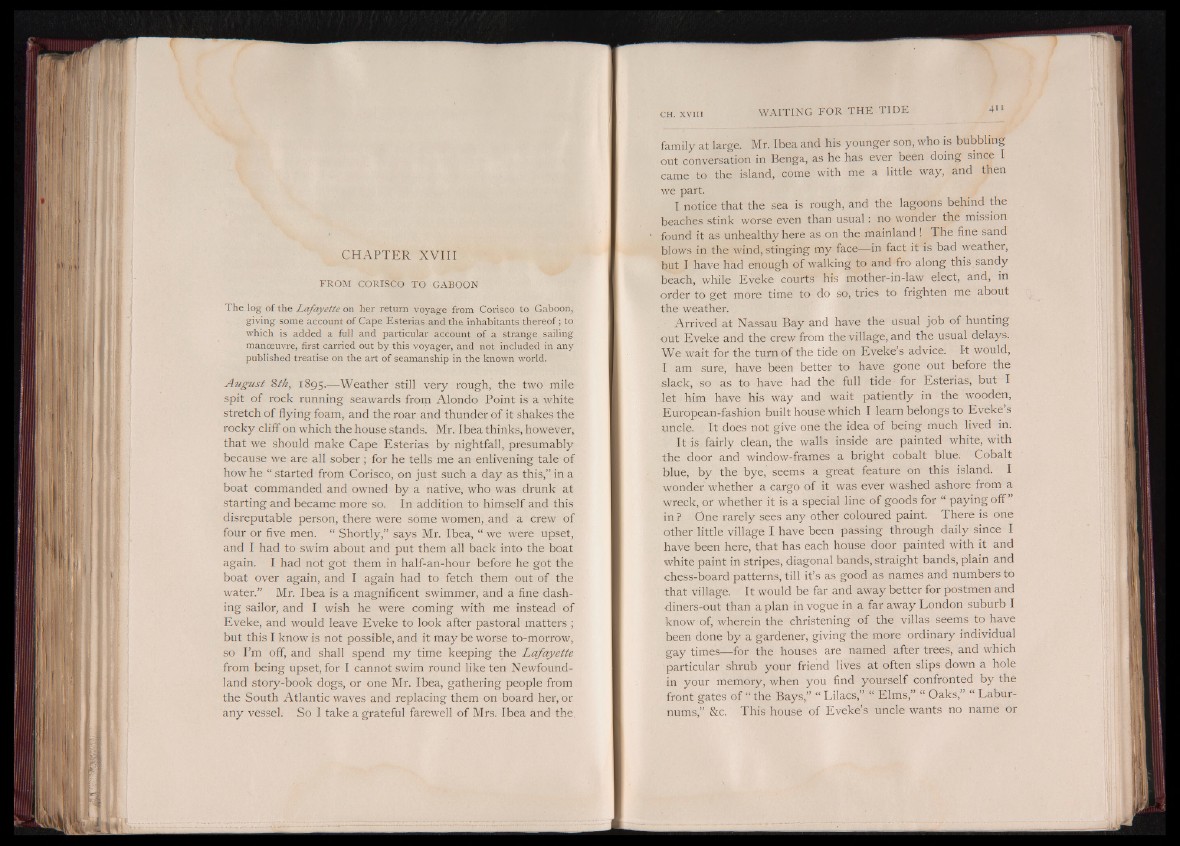
CH AP TER X V III
FROM CORISCO TO GABOON
The log of the Lafayette on her return voyage from Corisco to Gaboon,
giving some account of Cape Esterias and the inhabitants thereof ; to
which is added a full and particular account of a strange sailing
manoeuvre, first carried out by this voyager, and not included in any
published treatise on the art of seamanship in the known world.
August 2>tk, 1895.— Weather still very rough, the two mile
spit of rock running seawards from Alondo Point is a white
stretch of flying foam, and the roar and thunder of it shakes the
rocky cliff on which the house stands. Mr. Ibea thinks, however,
that we should make Cape Esterias by nightfall, presumably
because we are all sober ; for he tells me an enlivening tale of
how he “ started from Corisco, on just such a day as this,” in a
boat commanded and owned by a native, who was drunk at
starting and became more so. In addition to himself and this
disreputable person, there were some women, and a crew of
four or five men. “ Shortly,” says Mr. Ibea, “ we were upset,
and I had to swim about and put them all back into the boat
again. I had not got them in half-an-hour before he got the
boat over again, and I again had to fetch them out of the
water.” Mr. Ibea is a magnificent swimmer, and a fine dashing
sailor, and I wish he were coming with me instead of
Eveke, and would leave Eveke to look after pastoral matters ;
but this I know is not possible, and it may be worse to-morrow,
so I’m off, and shall spend my time keeping the Lafayette
from being upset, for I cannot swim round like ten Newfoundland
story-book dogs, or one Mr. Ibea, gathering people from
the South Atlantic waves and replacing them on board her, or
any vessel. So I take a grateful farewell of Mrs. Ibea and the.
family at large. Mr. Ibea and his younger son, who is bubbling
out conversation in Benga, as he has ever been doing since I
came to the island, come with me a little way, and then
we part.
I notice that the sea is rough, and the lagoons behind the
beaches stink worse even than usual: no wonder the mission
found it as unhealthy here as on the mainland! The fine sand
blows in the wind, stinging my face— in fact it is bad weather,
but I have had enough of walking to and fro along this sandy
beach, while Eveke courts his mother-in-law elect, and, in
order to get more time to do so, tries to frighten me about
the weather.
Arrived at Nassau Bay and have the usual job of hunting
out Eveke and the crew from the village, and the usual delays.
We wait for the turn of the tide on Eveke’s advice. I-t would,
I am sure, have been better to have gone out before the
slack, so as to have had the full tide for Esterias, but I
let him have his way and wait patiently in the wooden,
European-fashion built house which I learn belongs to Eveke s
uncle. It does not give one the idea of being much lived in.
It is fairly clean, the walls inside are painted white, with
the door and window-frames a bright cobalt blue. Cobalt
blue, by the bye, seems a great feature on this island. I
wonder whether a cargo of it was ever washed ashore from a
wreck, or whether it is a special line of goods for “ paying off”
in ? One rarely sees any other coloured paint. There is one
other little village I have been passing through daily since I
have been here, that has each house door painted with it and
white paint in stripes, diagonal bands, straight bands, plain and
chess-board patterns, till it’s as good as names and numbers to
that village. It would be far and away better for postmen and
diners-out than a plan in vogue in a far away London suburb I
know of, wherein the christening of the villas seems to have
been done by a gardener, giving the more ordinary individual
gay times-— for the houses are named after trees, and which
particular shrub your friend lives at often slips down a hole
in your memory, when you find yourself confronted by the
front gates of “ the Bays,” “ Lilacs,” “ Elms,” “ Oaks,” “ Laburnums,”
&c. This house of Eveke’s uncle wants no name or